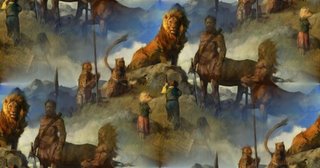 Here's something from my notes a year ago when I was writing Talking of Dragons. This is also in the book itself.
Here's something from my notes a year ago when I was writing Talking of Dragons. This is also in the book itself.Recently, it occurred to me that there is a Bible story told in miniature in The Last Battle. This is nothing unusual: Lewis' writings are filled with this sort of imaginative re-telling (the story of the Garden of Eden in Perelandra; the Tower of Babel in That Hideous Strength; the Crucifixion and Resurrection of Christ in The Lion, the Witch, and the Wardrobe), usually with a creative twist, but this is one I've not noticed before.It involves Tirian, last king of Narnia in The Last Battle. Notice some key facts about his story:
1. He is of the royal house in a great country.
2. His people have become enslaved by a foreign power.
3. He sees one of the slave-drivers beating one of his countrymen.
4. He flies into a rage and kills the slave-driver.
5. He flees for his life.
6. This act causes him to lose his noble and royal position.
7. He returns to lead his people to freedom.
Sound familiar? It should, for it mirrors the story of Moses as recounted in the book of Exodus. But remember: Lewis usually adds a twist when incorporating these Biblical narratives into his fiction. In this case, it involves the entrance into the 'Promised Land': Aslan's Country. Moses is forbidden (at least for the time being) to enter the Land, but Tirian, in this apocalyptic reversal, does enter the Land. Of course, the Land he enters is the True Narnia, of which the Narnia of Tirian's world (and the Caanan of Moses's world) is but a type and a shadow. Through Aslan (Christ, the greater New Covenant counterpart to Moses), we have been guaranteed entrance into that Country by faith alone. When we do get there, we shall surely find, like Tirian, that, 'the term is over: the holidays have begun. The dream is ended: this is the morning.' (The Complete Chronicles of Narnia, 524)

No comments:
Post a Comment